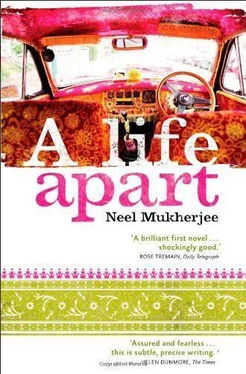In the autumns, during the Durga Puja celebrations, there are steam engines drawing the tramcar carriages on Chowringhee Road, carrying pilgrims from and to the temple in Kalighat. These ghats are something which Miss Gilby had never seen before coming to Calcutta. They had grown on her so much that in the autumns and winters she and Ali -miyan , sometimes with Mrs. Cameron, used to take the air in the early afternoons on the banks of the Hooghly, with Ali -miyan keeping up a running commentary about the history and names of the scores of ghats which dot the stretch of the river.
Ali -miyan guided the coachman as the brougham made its way from Kashipur in the north to Hastings on the Ganges estuary in the south, pointed out the ghats — steps leading down to the water, sometimes half submerged, made of marble or bricks, at other times docks really, for landing, anchoring and hauling of goods — and reeled off their names and explanations that awed Miss Gilby: ‘Look, Miss Gilby, that’s Ahiritolla Ghat, named so because this was the area where cowherds and milkmen lived’; ‘That’s Nimtolla Ghat, where Hindus cremate their dead’. Miss Gilby had been disturbed much more by this social ritual of people burning their dead on the banks of a river than by the odd practice of people bathing outdoors. She found the funeral practices primitive and didn’t encourage Ali -miyan to elaborate on this, quickly diverting him to give her a prolix history of another ghat, Huzurimal Ghat, or the ones with English names — Jackson sahib ’s Ghat, Colvin Ghat, Foreman sahib ’s Ghat. Miss Gilby has always found it amazing that the ghats are used for bathing, cremating, as docking and landing points of goods to be transported either inland or on the river. Even though each ghat is given over to only one of these functions, Miss Gilby is still struck by this unusual commingling of cleansing, commerce and ritual as if life, living and death were interchangeable, or all one.
She keeps repeating to herself that she will return to this city, that the appointment in Nawabgunj is only for a few years, but something deeper and unnameable, both inside and outside her, impels her to traverse the lengths and breadths of Calcutta in her brougham or in tramcars as if she were breathing in her last of the place, etching it solidly in her mind in a way only people who know they are never going to return do.
There are letters to write — polite‘thank you’ notes, more intimate ones to one or two of her friends here, slightly more formal ones letting acquaintances know of her new address and residence, a more general one to the members of the Anglo-Indian community she knows through Clubs, that sort of thing. These she usually keeps for the mornings. Afternoons are taken up with visiting or, in those rare spare hours, travelling through the city, mostly on her own. It is a little adventure, partly thrilling, partly fearsome, she rations to herself as a treat.
The evenings are mostly taken up, although reluctantly and with much misgiving, by the Club. This is on the insistence of Mrs Cameron, her only true friend in Calcutta. A widow who had been married to the Lieutenant-Governor of Allahabad, she had moved down east shortly after her husband’s death. Her ten-year-old daughter, Jane, was in London and her younger son, Christopher, at Summerfield. Sending her children, both born in India, to be educated back Home was the only sign of conformity to Raj society she had shown. Fiercely independent and unconventional, she had cocked a snook at Calcutta’s ossified Anglo-Indian society: ignoring the listings in the Warrant of Precedence; setting up schools for the education of Indian women in her own backyard and, in the winter months, in her garden; campaigning for the end of the moorgi khana in Clubs — her sins were so numerous that she was practically on the verge of ostracism by the unforgiving Anglo-Indian community. But she was one of life’s great irrepressibles, a true free spirit, and Miss Gilby knew that she enjoyed every bit of the controversy attaching to her, down to her outcast status, her lack of invitations to the Governor’s balls or the Viceroy’s Winter Dances: these were things that didn’t matter to her. She laughed at them, laughed at the choreographed dance of folly, which her countrymen indulged in, and held their snobbery in deep contempt. It was she who had recognized a kindred spirit in Miss Gilby and, on her arrival in Calcutta, had tested the newcomer by throwing to the winds the whole mad business of calling cards and appearing on her doorstep to invite Miss Gilby to afternoon tea; Miss Gilby had been utterly delighted. Mrs Cameron had warned her, ‘If you are intelligent, try and hide it if you can: a clever woman is not a very popular item in this jolly place.’
Miss Gilby and Mrs Cameron had taken on the might of the Club with glee. While most considered that they had lost, the two women knew they had nothing to lose. Besides, they were financially independent and sufficiently high up the ladder for any of the mutterings and whisperings to really bite. Despite a lot of coldshoulders andfrosty behaviourat the Club, theyhadpersisted in socializing there in the evenings when there was nothing to be done — ‘Maud, we cannot stop going to the Club, it will be a victory for them, don’t you see? If they think they can make things difficult for us there, don’t you think we can do exactly the same for them? They are far more uncomfortable with our presence than we are with theirs. We don’t care, they do, that’s our trump card’ — and had even ended up earning a sort of grudging respect.
Gimlets or pegs of whisky and soda on the lawns, a spot of tennis very early in the morning, even swimming sometimes, the endless rounds of gossip and talking about the intransigence of servants: it was amusing how she who had suffered all these obligatory things should now feel herself poised on the brink of missing them, trying to fit them in in her final days so that they were fixed in some future memory.
One advantage Mrs Cameron certainly had over the outraged little Anglo-Indians was the quality of her dinner parties. Here, she was nonpareil, an unqualified social success. And here, too, she broke all the rules. She tore up the Warrant of Precedence and seated guests wherever her fancy or mood took her. At one such party in the early days of her stay in Calcutta, she had seated an army officer in the wrong place, at which the incensed guest had informed her that he was a full colonel; she had chirpily replied, ‘Are you really? Well, I do so hope that when dinner is over you will be fuller still.’
Miss Gilby had found in the older woman a soulmate, a mentor who exposed in her the nervous steel to do things about which she would either have thought twice before or, having done it, would have felt lonely in the isolation that committing such a deed would have almost certainly brought her.
Suddenly Miss Gilby feels a pang of sorrow for her impending separation from Violet Cameron. Mrs Cameron is a little surprised at Miss Gilby’s insistence on strolling in the Eden Gardens or walking down the Strand as the bands played, two or sometimes three times a week, even during the wet, squally afternoons. Could it possibly be because Miss Gilby is trying to hold on to her company in these last few days left to her? Solamen miseris socios habuisse doloris , but could not the same be said of happy people in the joy they took of each other? They will write to each other regularly and, yes, this communication is going to take a lot longer than the scores of chits circulated around the community and carried by the servants to and fro, and it will not have the immediacy and urgency of a chit written half an hour before its delivery to the addressee by a hot-footed servant, but it will have to do.
Читать дальше












